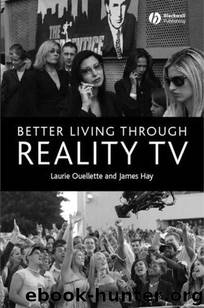Better Living through Reality TV: Television and Post-Welfare Citizenship by Laurie Ouellette;James Hay

Author:Laurie Ouellette;James Hay [Hay, Laurie Ouellette;James]
Language: eng
Format: epub
Published: 2009-08-20T10:33:00+00:00
Branding the Self: TV Talent/Job Searches
The televised talent/job search is a form of makeover TV to the extent that experts, teachers, and judges seek to transform raw human potential into coveted opportunities for self-fulfillment through the realization and expression of talent. Such programming ranges from the amateur talent search revitalized by American Idol (Fox) to programs that attempt to discover new talent (usually in the business, fashion, or performance sectors) by immersing contestants in a grueling training regimen and/or competitive elimination process (Making the Band, VH1; America's Next Top Model, UPN; The Cut, CBS; I Want to Be a Hilton, NBC; The Apprentice, NBC; Project Runway, Bravo; American Inventor, NBC). Both strands are entrepreneurial in many senses, including the way in which unpaid labor becomes a commodity for exploitation by the culture industries, who profit not only from the TV shows and related merchandise, but also from the consumer goods and services (CDs, fashion, advertising campaigns) produced through the shows as incubators of talent. Talent/job searches are entrepreneurial in another way as well: Within the flexible economy, they work to produce what du Gay calls the governing rationality of the self-enterprising worker.25 TV governs from a distance through these ventures by circulating techniques for "self-steering" in the new labor economy, and by enacting processes of governing the self at work.
According to Sennett, the changing nature of work produces three mighty challenges for contemporary workers: The first is what he calls the compression of time, which requires the embrace of new strategies for "managing short-term relationships, and oneself, while migrating from task to task, job to job, place to place." The second challenge is to remain marketable in an economy that values potential ability and a capacity to multitask over the ideal of "learning to do one thing really well." Since the "shelf life of many skills is short," workers must retrain frequently, and they also work to discover and develop new talents and abilities inside themselves. Finally, the worker must learn to "let go of the past," says Sennett. In the flexible economy, "work is not a possession, nor does it have a fixed content." It "becomes a position in a constantly changing network," and while people may compete for position in the corporation, no "one location is an end to itself' and no one "owns" their place. As past experience and prior service become less valued, the worker is drawn into a "self-consuming passion" to keep themselves mobile within the labor force. While this process has something in common with the "constant search for new things" endorsed by consumer culture, it is "larger than simply being so ambitious one is never content with what one has." One consequence of the ongoing corporate reinvention and restructuring that defines the current economy is that "work identities get used up - they become exhausted," which requires the worker to embrace constant reinvention as well.26
Illustration 3.2 Would-be models must work on their looks as well as their personalities in the competition, America's Next
Download
This site does not store any files on its server. We only index and link to content provided by other sites. Please contact the content providers to delete copyright contents if any and email us, we'll remove relevant links or contents immediately.
| Direction & Production | Genres |
| Guides & Reviews | History & Criticism |
| Reference | Screenwriting |
| Shows |
Head of Drama by Sydney Newman(2028)
Robin by Dave Itzkoff(2017)
I'm Judging You by Luvvie Ajayi(1896)
The Paranormal 13 (13 free books featuring witches, vampires, werewolves, mermaids, psychics, Loki, time travel and more!) by unknow(1852)
Single State of Mind by Andi Dorfman(1518)
Ten by Gretchen McNeil(1507)
#MurderTrending by Gretchen McNeil(1402)
Key to the Sacred Pattern: The Untold Story of Rennes-le-Chateau by Henry Lincoln(1356)
Most Talkative by Andy Cohen(1314)
Merv by Merv Griffin(1271)
This Is Just My Face by Gabourey Sidibe(1186)
Notes from the Upside Down by Guy Adams(1183)
Jamie Oliver by Stafford Hildred(1151)
The Hunger Games: Official Illustrated Movie Companion by Egan Kate(1125)
Springfield Confidential by Mike Reiss(1112)
Clarkson--Look Who's Back by Gwen Russell(1082)
The TV Writer's Workbook: A Creative Approach To Television Scripts by Ellen Sandler(1076)
Blue Planet II by James Honeyborne & Mark Brownlow(1026)
Dark Angel by D. A. Stern(1018)
